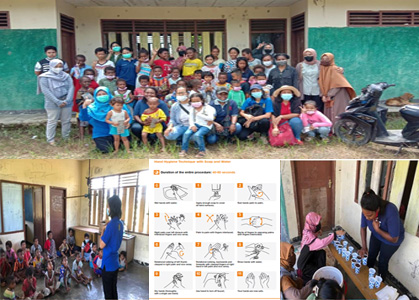Edukasi Perilaku Hidup Bersih Dan Sehat (PHBS) Pada Anak-Anak di Kampung Pemekaran Mister Ngiosi Manokwari Pada Masa Pandemi Covid-19
Education of Clean and Healthy living Behavior (PHBS) to children in Kampung Pemekaran Mister Ngiosi Manokwari during the Covid-19 Pandemic
DOI:
https://doi.org/10.46549/igkojei.v2i3.241Keywords:
Key words: Clean and Healthy Lifestyle; children; Covid-19 PandemicAbstract
Clean and Healthy Lifestyle (PHBS) are all health behaviors that are carried out with awareness so that family or family members can help themselves in the health sector and play an active role in health activities in the community. This community service program is motivated by limited access to information, transportation and health in rural areas of Kampung Pemekaran Mister Ngiosi Manokwari causing a lack of understanding and application of a clean and healthy lifestyle by children, especially during the Covid-19 pandemic. To overcome this gap, it is necessary to disseminate information about clean and healthy living behavior in children. Activities on PHBS are using interactive learning in the form of lectures and giving some questions related to the PHBS and reward, demonstration related to preventing the transmission of Covid-19. The results of the activity showed that about 80% of the children could carry out 11 steps of hand washing activity well. In terms of healthy food, 100% of the children finished the given food.
Downloads
References
Kementerian Kesehatan Direktorat Promosi Kesehatan dan Pemberdayaan Masyarakat. (2016) Perilaku Hidup Bersih dan Sehat. PHBS kemkes.go.id (Accessed: 21 Desember 2020).
Kementerian Kesehatan Direktorat Promosi Kesehatan dan Pemberdayaan Masyarakat. (2012) Perilaku Hidup Bersih dan Sehat di Sekolah. https://promkes.kemkes.go.id/?p=1642 (Accessed: 21 Juni 2021).
Rahmawati, M. C. dan Dewi, N. D. L. (2019) ‘Penanaman perilaku hidup bersih dan sehat di PAUD Atmabrata, Cilincing, Jakarta’. Jurnal Pemberdayaan Masyarakat, 3(1), pp. 42-49.
Wati, P. D. C. A. and Ridlo, I. A. (2020) ‘Perilaku Hidup Bersih dan Sehat pada Masyarakat di Kelurahan Rangkah Kota Surabaya’, Jurnal Promkes: The Indonesian Journal of Health Promotion and Health Education, 8(1), pp. 47–58. doi: 10.20473/jpk.v8.i1.2020.47-58.
Pittet, D. (2009) WHO Guidelines on Hand Hygiene in Health Care : A Summary First Global Patient Safety Challenge Clean Care is Safer Care, World Health Organization. Switzerland: World Health Organization can be obtained from WHO Press. Available at: http://whqlibdoc.who.int/publications/2009/9789241597906_eng.pdf.

Downloads
Published
How to Cite
Issue
Section
License
License and Copyright Agreement
In submitting the manuscript to the journal, the authors certify that:
- They are authorized by their co-authors to enter into these arrangements.
- The work described has not been formally published before, except in the form of an abstract or as part of a published lecture, review, thesis, or overlay journal. Please also carefully read IGKOJEI: Jurnal Pengabdian Masyarakat Posting Your Article Policy at https://journal.fapetunipa.ac.id/index.php/igkojei/policy/publicationethics
- That it is not under consideration for publication elsewhere,
- That its publication has been approved by all the author(s) and by the responsible authorities – tacitly or explicitly – of the institutes where the work has been carried out.
- They secure the right to reproduce any material that has already been published or copyrighted elsewhere.
- They agree to the following license and copyright agreement.
Copyright
Authors who publish withIGKOJEI: Jurnal Pengabdian Masyarakat agree to the following terms:
- Authors retain copyright and grant the journal right of first publication with the work simultaneously licensed under a Creative Commons Attribution License (CC BY-NC-SA 4.0) that allows others to share the work with an acknowledgment of the work's authorship and initial publication in this journal.
- Authors are able to enter into separate, additional contractual arrangements for the non-exclusive distribution of the journal's published version of the work (e.g., post it to an institutional repository or publish it in a book), with an acknowledgment of its initial publication in this journal.
- Authors are permitted and encouraged to post their work online (e.g., in institutional repositories or on their website) prior to and during the submission process, as it can lead to productive exchanges, as well as earlier and greater citation of published work.

This work is licensed under a Creative Commons Attribution-NonCommercial-ShareAlike 4.0 International License.






